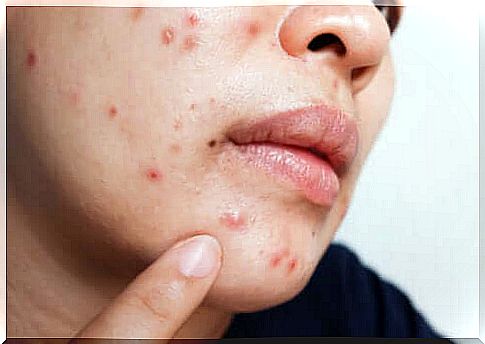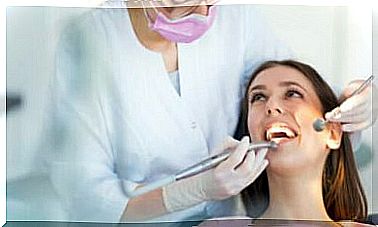Isotretinoin For Acne: Benefits And Side Effects
Isotretinoin is a very effective medicine, but care should be taken when using it. In the majority of cases, it resolves acne problems but, at the same time, it can cause serious side effects.

Isotretinoin is a drug used to treat moderate to severe acne. It is available in 10, 20 and 40 milligram capsules and is estimated to be effective up to 80% of the time. The average treatment lasts between four and five months.
Isotretinoin is sometimes prescribed to treat other skin problems or certain types of cancer. Despite its effectiveness, it has been associated with serious side and unwanted effects. It causes birth defects and that is why pregnant women should not consume it. It is also not used simultaneously with vitamin A supplements.
What is isotretinoin used for?
Although isotretinoin can be used to treat different types of acne, it is almost always prescribed to treat a severe condition called severe recalcitrant lumpy acne. Usually, it is prescribed when other approaches have not worked.
It is one of the most effective acne medications. In some cases, it is also used to treat problems such as rosacea, hidradenitis suppurativa, folliculitis decantis, chronic hand dermatitis, skin photoaging and psoriasis. In addition, it has been used in the treatment of certain types of skin cancer since the 1980s.
What are the benefits of isotretinoin for the body?
Isotretinoin is a drug that works at different levels. It has a comedolytic action, that is to say it prevents the formation of the plug which gives rise to comedones or blackheads. This leads to a very significant improvement in the lesions that are already present and prevents the appearance of new ones.
This medicine inhibits the proliferation of a bacteria called Propionibacterium acnes . The microorganism is found naturally in the skin, but its development causes various infections, including acne.
In addition, isotretinoin has an anti-inflammatory action. One of its main benefits is that it decreases the production of sebum. This makes it very effective in dealing with many skin problems.

Side effects of isotretinoin
The side effects of isotretinoin can be mild or severe. Regarding the mild effects, we find the increase in dryness that affects the skin, lips, nose and eyes. This leads to difficulties like chapped lips, nasal bleeding and dry eyes.
These side effects almost always go away on their own. When this is not the case, we must consult a doctor. In addition, this drug has also been associated with other more serious reactions that we will see later.
High cholesterol
The medicine may cause blood cholesterol levels to rise. This is more common in people who are overweight, have diabetes, metabolic syndrome, or who drink alcohol. The ideal is to do a regular follow-up through blood tests.
Muscle problems
Pain in the joints and muscles has been reported in people who consume isotretinoin. In adolescents, it may slow down the normal growth of long bones. Additionally, it can cause muscle weakness.
Pressure in the brain
Pressure in the brain is not a common effect, but it is very serious. It can cause loss of vision and even death of the patient. This pressure manifests itself through symptoms such as very severe headaches, dizziness, nausea, vomiting and blurred vision. This condition must be taken care of as soon as possible.
Skin rash
In some cases, a rash appears which can be serious, although this is not common. It is considered a medical emergency and may be accompanied by the following symptoms:
- Blisters on the arms, legs or face.
- Sores on the eyes, nose, mouth or throat.
- Desquamation on the skin.
Organ damage and toxicity
Isotretinoin can damage organs such as the liver , pancreas, intestine and esophagus. It is rare for this to happen. Symptoms like digestive bleeding, yellowish skin, diarrhea, dark urine and very severe pain in the abdomen are warning signs.
Hearing problems
It is possible, although unusual, for this medicine to cause hearing loss or ringing in the ears. If this happens, it is important to seek immediate medical attention.
Visual problems
The drug can cause dry eyes, but also an unusual amount of tears in the eyes. In addition, it sometimes leads to blurred vision, double vision or tunnel vision. It is also possible to have difficulty having in the dark.
Allergic reactions
This drug causes moderate or severe allergic reactions. Sometimes there is a rash, bruising on the legs or red spots. If there is hives, inflammation of the face or difficulty in breathing, it is necessary to go to the emergency room.
Diabetes
This side effect of isotretinoin is also not common. In some people, it causes blood sugar problems which can lead to diabetes. Pay attention to the symptoms and report your doubts to a doctor.
Low levels of red blood cells
This medicine can lower the level of red blood cells in the blood and cause illnesses such as anemia. The main symptoms are weakness, fatigue, dizziness, pale skin, and cold hands and feet.
Low levels of white blood cells
Low levels of white blood cells increase the risk of getting infections. If a person takes this medicine and has a fever or infections more frequently than usual, they should talk to their doctor. In any case, this does not happen frequently.
Mental problems
Isotretinoin can cause serious mental health problems. It is possible that it gives rise to depression, suicidal thoughts and even psychosis or loss of contact with reality. If you notice any noticeable changes in mood or behavior, you should definitely see your doctor.
Considerations before taking isotretinoin

Everyone should be fully informed about the risks of isotretinoin. In some cases, it is necessary to sign an informed consent. The patient should tell the doctor if they ingest other drugs, supplements or substances on a regular basis.
Many of the more serious effects are related to pregnancy. A pregnant or breastfeeding woman should not take this medicine, just like a woman who is planning to become pregnant. Isotretinoin could indeed cause abortion, premature birth or fetal malformations.
If a woman is taking this medicine, she should make sure that she is taking reliable contraceptive methods. In the case of men, the substance can remain in the semen and it is not known whether this has any effects if he impregnates a woman. Therefore, it is better to be careful.
Isotretinoin: a drug that requires caution
It should be taken into account that some of the side effects caused by isotretinoin are reversible, but others are not. Sometimes it is enough to stop taking this medicine, and in other cases the damage is permanent.
A substance like isotretinoin should be consumed with caution. You should follow the directions exactly, perform the prescribed tests and inform the doctor of any changes or concerns.









